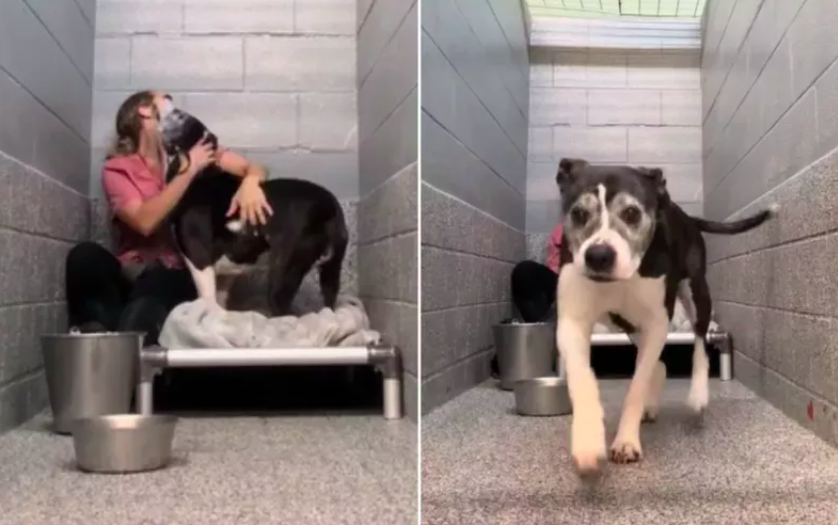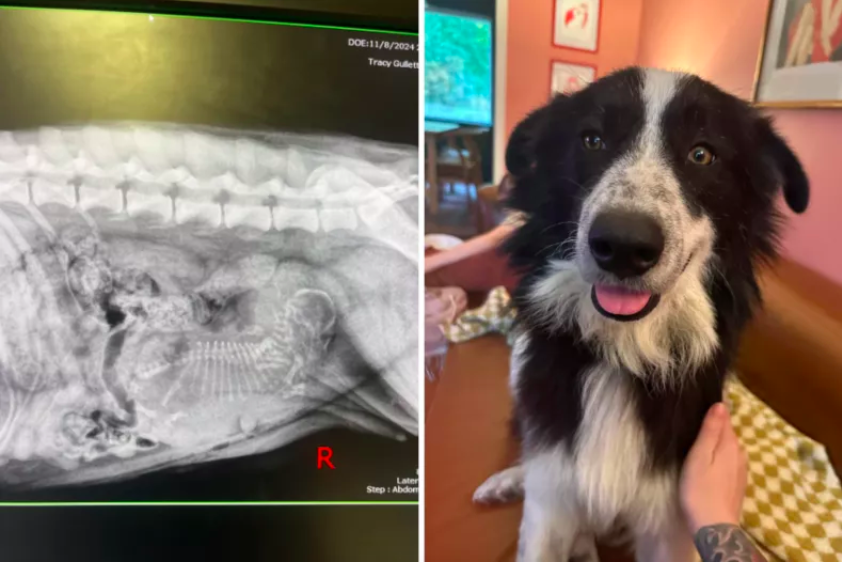Trending Pet Stories
Understanding Canine Cognitive Dysfunction: A Compassionate Look at Dog Dementia

Understanding Canine Cognitive Dysfunction: A Compassionate Look at Dog Dementia
The Heartbreaking Reality of Dog Dementia
In a poignant and heart-wrenching video that has touched the hearts of millions, the harsh reality of canine cognitive dysfunction, also known as dog dementia, is brought to light. The video features Buddy, a dog diagnosed with dementia, aimlessly circling in his backyard, a behavior that has developed as his condition has worsened. Shared by his owner @piayboyfartii on TikTok, the clip has garnered over 5 million views and elicited numerous sympathetic comments from viewers worldwide.
Shedding Light on Canine Cognitive Dysfunction
Canine cognitive dysfunction (CCD) or cognitive dysfunction syndrome (CDS) is a condition similar to Alzheimer’s disease in humans, primarily affecting older dogs. It is characterized by age-related changes in the brain that can lead to symptoms such as disorientation, confusion, changes in sleep patterns, and altered behavior. As dogs age, their cognitive function may decline, impacting their quality of life and interactions with their environment.
The Emotional Impact of Dog Dementia
The video of Buddy walking in little circles, forgetting even his last steps, paints a heartbreaking picture of the challenges faced by dogs with dementia. @piayboyfartii’s emotional caption, “Watching your dog who recently got diagnosed with dementia forget everything, even his last steps which causes him to walk in little circles,” encapsulates the profound impact of this condition on both dogs and their owners. The sense of helplessness and sorrow experienced by owners witnessing their beloved pets struggle with cognitive decline is palpable.
@piayboyfartii i wish it was me instead little guy i love u can we get some love for buddy in the comments #fyp #foryoupage #dementia #dogdementia
Seeking Support and Understanding
For dog owners concerned about their pet’s behavior or noticing sudden changes indicative of cognitive dysfunction, consulting a veterinarian is crucial. Veterinarians can provide guidance on managing the symptoms of CCD, improving the quality of life for affected dogs, and offering support to pet owners navigating the challenges of caring for a dog with dementia. Understanding the signs and symptoms of dog dementia, such as disorientation, pacing, and changes in social interactions, is essential for early detection and intervention.
Coping Strategies and Compassionate Care
While there is no cure for canine cognitive dysfunction, there are strategies that can help manage the condition and enhance the well-being of dogs affected by dementia. Providing a safe and familiar environment, maintaining a consistent routine, engaging in mental stimulation activities, and ensuring proper nutrition and veterinary care are vital components of compassionate care for dogs with dementia. Additionally, offering patience, understanding, and unconditional love to dogs experiencing cognitive decline can make a significant difference in their quality of life.
Conclusion
The journey of a dog with dementia is filled with challenges, but it is also marked by moments of love, connection, and resilience. By raising awareness about canine cognitive dysfunction and fostering a deeper understanding of the emotional toll it takes on dogs and their owners, we can create a more compassionate and supportive environment for those affected by this condition. Through empathy, education, and proactive care, we can honor the bond between humans and their canine companions, even in the face of cognitive challenges.
Frequently Asked Questions (FAQs)
What is canine cognitive dysfunction (CCD) or cognitive dysfunction syndrome (CDS)?
Canine cognitive dysfunction is a condition similar to Alzheimer’s disease in humans, primarily affecting older dogs and characterized by age-related changes in the brain that lead to symptoms such as disorientation, confusion, and altered behavior.
What are some common signs of dog dementia?
Common signs of dog dementia include disorientation, changes in sleep patterns, altered behavior, pacing, and decreased social interactions.
How can pet owners support dogs with dementia?
Pet owners can support dogs with dementia by providing a safe and familiar environment, maintaining a consistent routine, engaging in mental stimulation activities, ensuring proper nutrition and veterinary care, and offering patience, understanding, and love.
Is there a cure for canine cognitive dysfunction?
There is no cure for canine cognitive dysfunction, but management strategies can help improve the quality of life for dogs affected by dementia.
Why is early detection and intervention important for dogs with dementia?
Early detection and intervention are crucial for dogs with dementia to receive timely care, support, and management strategies that can enhance their well-being and quality of life.
We appreciate you for taking the time to read this article!
Finally, we hope you found this article interesting? And what do you think about ”Understanding Canine Cognitive Dysfunction: A Compassionate Look at Dog Dementia!?”
Please feel free to share or inform your friends about this article and this site, thanks!
And let us know if you observe something that isn’t quite right.
References: https://www.newsweek.com/woman-heartbreaking-reality-dog-dementia-walk-little-circles-1901762
Trending Pet Stories
Dog Shelter’s Longest Resident: Grandma’s Sweetest Reaction to a Visitor

Dog Shelter’s Longest Resident: Grandma’s Sweetest Reaction to a Visitor
Introduction: A Heartwarming Tale of Resilience
Animal shelters across the U.S. are filled with dogs longing for forever homes, but few stories are as touching as that of Grandma, a 9-year-old boxer-pit bull mix. As the longest-term resident at Junction City Animal Shelter in Kansas, Grandma’s tale highlights the struggles and incredible love senior dogs offer.
In this article, we explore Grandma’s journey, her charming personality, and the challenges faced by older shelter dogs like her.
Grandma’s Arrival: Abandoned but Not Broken
Grandma’s journey began on November 5, 2023, when she arrived at Junction City Animal Shelter as a stray. Shelter staff later found her previous owner, who could no longer care for her. Vanessa Gray, the shelter director, shared:
“Grandma is an older gal with a nurturing demeanor that inspired her name.”
Despite her difficult start, Grandma quickly endeared herself to the shelter staff with her gentle nature and resilience.
Getting to Know Grandma: A Special Soul
Over time, Grandma revealed her unique personality and preferences:
- Loves Cozy Blankets: Grandma enjoys snuggling up in soft blankets.
- Sunbathing Enthusiast: She relishes roaming the yard and soaking up the sun.
- Playful Companion: From fetch to chew toys, Grandma’s playful side shines.
Her affectionate demeanor and love for human interaction make her a perfect candidate for a loving home.
Why Senior Dogs Like Grandma Face Challenges
Sadly, Grandma’s story isn’t unique. Senior shelter dogs often face longer waits for adoption. A 2021 study in the Animals journal found common traits in long-term shelter residents:
- Older age.
- Larger size.
- Belonging to misunderstood breeds.
- Specific needs, such as being the only pet in the home.
For Grandma, her age, size, and breed have created challenges in attracting adopters.
A Viral Moment: Grandma’s Reaction to a Visitor
Recently, Junction City Animal Shelter shared a video of Grandma on TikTok. The clip shows her joyfully interacting with a staff member, eagerly wagging her tail and playing. The caption, “I’m not crying… you’re crying,” perfectly captures the emotional moment.
This viral footage highlights Grandma’s loving nature and proves she’s still full of life, ready for a family to cherish her.
Life in a Shelter: The Toll on Senior Dogs
Shelter life can be tough for older dogs like Grandma. While she handles the noise and routine better than many, the lack of a permanent home takes its toll. Gray shared:
“This is still not the place for any animal, especially a senior. There is so much noise.”
Fortunately, Junction City Shelter doesn’t euthanize animals, giving Grandma the time she needs to find a family.
What Makes Grandma the Perfect Pet?
Grandma is a loving and low-maintenance companion. Here’s what makes her ideal:
- Solo Star: She thrives in homes without other pets.
- Easygoing Nature: Grandma enjoys her independence but loves human attention.
- Perfect for Any Home: Her calm demeanor makes her suitable for families or individuals.
Advocating for Senior Dogs Like Grandma
Grandma’s story represents countless senior dogs in shelters. Adopting an older dog comes with unique rewards:
- Calm Temperament: Senior dogs are often more predictable and relaxed.
- Deep Bonding: Older dogs form strong emotional connections with adopters.
- Gratitude: They often show immense appreciation for their new homes.
How You Can Help
If you’re moved by Grandma’s story, here are ways to make a difference:
- Adopt: Open your heart and home to a senior dog.
- Volunteer: Spend time with shelter animals to brighten their days.
- Donate: Support shelters with supplies or financial aid.
- Share: Spread the word about adoptable senior pets like Grandma.
Conclusion: Grandma’s Forever Home Awaits
Grandma’s journey is a testament to resilience and unconditional love. As the shelter staff work tirelessly to find her the perfect home, her story reminds us of the joy and companionship senior dogs bring.
Could you be the one to give Grandma the life she deserves? Visit Junction City Animal Shelter to meet her today.
FAQs About Senior Dog Adoption
Why adopt a senior dog?
Senior dogs are calm, loving, and often trained, making them excellent companions.
Are older dogs harder to care for?
While they may require more vet visits, their mature temperament often makes them easier to manage than younger dogs.
Can senior dogs adjust to new homes?
Yes! With patience and love, senior dogs adapt quickly and bond deeply with their families.
What challenges do senior shelter dogs face?
Older dogs often struggle with age-related stigma, breed stereotypes, and limited interest from adopters.
How can I help if I can’t adopt?
You can volunteer, donate, or share stories of senior dogs to raise awareness and support their adoption.
We appreciate you for taking the time to read this article!
Finally, we hope you found this article interesting? And what do you think about ”Dog Shelter’s Longest Resident: Grandma’s Sweetest Reaction to a Visitor!?”
Please feel free to share or inform your friends about this article and this site, thanks!
And let us know if you observe something that isn’t quite right.
References: Newsweek Original Article
Trending Pet Stories
Gift Guide 2024: The Best Gifts for Pet Owners
Trending Pet Stories
Routine Spay Appointment Reveals Shocking Secret About Rescue Dog

Routine Spay Appointment Reveals Shocking Secret About Rescue Dog
When a Tennessee woman decided to spay her newly adopted rescue dog, Salem, she never imagined the twist that would follow. In an unexpected revelation, a routine veterinary procedure unveiled a surprising truth that captivated pet lovers online.
Adopting Salem: A New Beginning
Haley Houghmaster and her family adopted Salem, an Australian shepherd and border collie mix, on October 26, 2024. Salem joined their family from Happy Tails Canine Rescue, a Memphis-based organization dedicated to helping stray and abandoned dogs find loving homes. According to Haley, Salem had seamlessly adjusted to her new surroundings, quickly becoming a beloved member of the household.
A Routine Appointment Turned Extraordinary
On November 3, just over a week after Salem’s adoption, Haley brought her to the vet for a spay appointment. What was supposed to be a standard procedure took an unexpected turn.
Once under anesthesia, the veterinarian made an incision and discovered Salem was heavily pregnant—with only one puppy. Haley shared the surprising news on Reddit, where her story quickly gained traction.
“Found out at spay appointment that my new rescue dog is pregnant with one puppy,” Haley captioned her Reddit post, accompanied by Salem’s X-ray image.
What Are Singleton Puppies?
Singleton puppies, or single-litter puppies, are a rarity in the canine world. According to pet experts, this condition can result from several factors, including a dog’s age, genetics, or environmental influences.
Why Are Singleton Puppies So Rare?
- Breed and Genetics: Certain breeds are more prone to single-litter births due to their genetic makeup.
- Stress and Environment: External stressors can influence the size of a dog’s litter.
- Health and Age: Older dogs or those with unique health conditions are more likely to carry fewer puppies.
Risks Associated with Singleton Births
While the thought of a single puppy might seem adorable, it does come with its challenges.
Potential Complications
- Labor Induction Issues: Typically, puppies induce labor by releasing cortisol. With only one puppy, there might not be enough hormone production, which could delay labor and necessitate a C-section.
- Placental Limits: A dog’s placenta is viable for about 63 days. If labor doesn’t occur by day 65, veterinary intervention becomes critical.
- Socialization Concerns: Singleton puppies may miss out on the crucial social interactions provided by littermates, potentially leading to behavioral challenges.
- Lactation Issues: A single puppy may not trigger sufficient milk production, depriving it of colostrum, the nutrient-rich first milk.
Haley’s Decision: Embracing the Miracle
Despite the risks, Haley decided to let Salem carry the pregnancy to term. Terminating at this stage could have posed significant dangers to Salem’s health.
“Since it’s just one puppy, I chose to keep it and let her try to deliver naturally,” Haley explained.
Salem is expected to deliver any day now, and Haley remains optimistic for a smooth delivery.
Expert Insights on Singleton Puppies
Dr. Harunur Rashid, in an article for Vet Advises, emphasizes that while rare, singleton litters are not unheard of. However, veterinarians need to monitor these pregnancies closely to ensure the safety of both the mother and puppy.
Dr. Marty Greer, a veterinarian at Revival Animal Health, notes that C-sections are often necessary in such cases. Without the natural triggers for labor, complications can arise, putting both mother and pup at risk.
A Viral Sensation: Salem’s Story Captures Hearts Online
Haley’s Reddit post resonated with pet lovers worldwide, garnering over 12,000 upvotes and hundreds of comments.
- “Congrats! She looks like a happy momma-to-be,” one user remarked.
- “What a surprise! We had a similar experience with our rescue,” another shared.
- Some cautioned Haley, noting that X-rays aren’t always precise: “Our vet said two puppies, but we ended up with eight!”
Found out at spay appt that my new rescue dog is pregnant with 1 puppy 😅
byu/Pipsmagee2 inDogAdvice
What’s Next for Salem and Her Puppy?
As Salem approaches her due date, Haley and her family are preparing for the arrival of their newest furry family member. They’re hopeful for an uneventful delivery and are excited to meet the puppy who has already captured so much attention.
Conclusion: A Rescue Dog’s Unexpected Journey
Salem’s story is a heartwarming reminder of the surprises life can bring, even in the most routine situations. Her journey from rescue dog to expectant mother has inspired thousands, showcasing the unpredictable beauty of life.
Frequently Asked Questions (FAQs)
What are singleton puppies?
Singleton puppies refer to litters with only one puppy. This condition is rare and influenced by factors such as breed, genetics, and environment.
Can singleton pregnancies be risky for dogs?
Yes, singleton pregnancies can pose risks, including complications during labor and insufficient milk production for the puppy.
How can vets help singleton pregnancies?
Veterinarians closely monitor singleton pregnancies and often recommend C-sections if natural labor doesn’t begin within the expected timeframe.
Why do singleton puppies face socialization issues?
Without littermates, singleton puppies may miss out on critical interactions that help develop their social and behavioral skills.
What should owners of singleton puppies do?
Owners should provide extra care, socialization opportunities, and veterinary checkups to ensure the puppy’s physical and emotional well-being.
We appreciate you for taking the time to read this article!
Finally, we hope you found this article interesting? And what do you think about ”Routine Spay Appointment Reveals Shocking Secret About Rescue Dog!?”
Please feel free to share or inform your friends about this article and this site, thanks!
And let us know if you observe something that isn’t quite right.
References: the original article on Newsweek.
-

 Pet Care2 years ago
Pet Care2 years agoThe Best Dog Collars For 2022
-

 Dogs2 years ago
Dogs2 years agoBichon Frise: The Happy, Playful, and Cuddly Companion
-

 Trending Pet Stories1 year ago
Trending Pet Stories1 year ago2023 ‘World’s Ugliest Dog’ Winner: Scooter’s Tale of Resilience
-

 Animals3 years ago
Animals3 years agoAre There Animals Having Down Syndrome?
-

 Pets2 years ago
Pets2 years agoThe Fascinating World Of The Red Chameleon
-

 Dogs3 years ago
Dogs3 years agoTop 10 Most Popular Dog Breeds According To AKC.
-

 Dogs3 years ago
Dogs3 years ago21 Dog Breeds That Resemble Bears Or Teddy Bears!
-

 Dogs3 years ago
Dogs3 years agoEskimo Dogs from Canada – What Are They? – Find Out!










